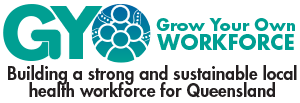Aboriginal and Torres Strait Islander workforce
While the following information and resources are specific to those seeking to attract, develop and retain an Aboriginal and Torres Strait Islander workforce, we strongly encourage you to review all of the information and resources provided on this website, as much of it relates to students and job seeker cohorts in general.
- Getting started resources
- Attracting & recruiting resources
- Developing your workforce resources
- Funding avenues resources
- Case studies
- Publications
Potential solutions to common challenges
Challenge
Limited capacity to provide support for Aboriginal and Torres Strait Islander job seekers, trainees and interns and employees
Work with Community Elders and local community groups with strong connections to the Aboriginal and Torres Strait Islander residents to gain a better understanding of workforce challenges and culturally-appropriate support mechanisms.
Investigate opportunities to obtain funding from the Australian and Queensland Government to provide support for Aboriginal and Torres Strait Islander peoples. There are several programs that not only help employers access Aboriginal and Torres Strait Islander job seekers but also provide personalised assistance to help build their skills and enable them to participate in work activities to their maximum capacity.
See:
Catholic Education Northern Territory Growing Our Own Program
Funding for recruitment
Funding for training
Investigate opportunities to link in with CareerTrackers, a non-profit organisation that provides support for Indigenous university students during their studies and links them with private sector employers to participate in paid internships. CareerTrackers can provide employers with advice on approaches to better suit and support Indigenous employees. They also provide interns with pre-employment leadership development training and Post-employment professional assistance, such as executive mentoring and peer encouragement.
See:
CareerTrackers Indigenous Internship Program
Consider conducting cultural competency and awareness training for staff who could become mentors.
Engaging Aboriginal and Torres Strait Islander peoples

To maximise the chances of success of creating a diverse workforce that is more reflective of the community it serves, it is important to give special consideration to ensuring culturally appropriate and adequate support is provided. This could include language and literacy training, resume assistance, mentoring and career coaching. The following are examples of strategic initiatives designed to support Aboriginal and Torres Strait Islander interns and trainees that could potentially be tapped into or tailored to grow a sustainable local workforce.
Career pathway resources
Career information that includes the lifecycle of a medical doctor, pathways to medical school and alternative pathways to medical school for Aboriginal and Torres Strait Islander peoples. Also includes guides covering topics such as speciality training pathways, working in rural and remote medical practices and rural recruitment and retention strategies. For more information visit https://ama.com.au/careers/
Aboriginal Employment Pathway Program
Job Centre Australia’s Aboriginal Pathway Program focuses on providing culturally appropriate connections with the community and individually focused employment solutions for Aboriginal and Torres Strait Islander people. For more information visit https://aepp.com.au/
Health Heroes
Information and video clips highlighting the wide range of job opportunities available for Aboriginal and Torres Strait islander people in the health sector. For more information visit http://healthheroes.health.gov.au/internet/heroes/publishing.nsf/Content/Home
National Rural Health Student Network (NRHSN)
Health Career Flyers developed for Rural Health Clubs to distribute to primary and secondary students as well as rural and Aboriginal and Torres Strait Islander communities, services and schools. For more information visit www.nrhsn.org.au/resources/career-flyers/
Queensland Health
Career advice and guidance for Queensland Health nurses and midwives. Includes information about career paths, graduate recruitment programs, Indigenous health career resources, training opportunities, salaries and benefits, processes and procedures to register to work for Queensland Health and a link to register for rural and regional jobs. For more information visit www.health.qld.gov.au/ocnmo/career-pathways
Recruitment resources
This document published by the National Disability Services (NDS), although specifically for Aboriginal and Torres Strait Islander employment in the disability sector, serves as a holistic guide for organisational readiness in implementing recruitment and retention strategies. The document also has handy tips, printable toolkits and culture-specific information which can aid attraction and recruitment of employees across all sectors. To access the document, see: https://www.nds.org.au/resources/aboriginal-and-torres-strait-islander-employment-guide-and-toolkit
Guide to hiring Aboriginal and Torres Strait Islander Staff
Information from the Fair Work Ombudsman for employers hiring or working with Aboriginal and Torres Strait Islander employees. Includes a link to the Fair Work Ombudsman’s factsheet about supporting workers during Sorry Business and their ‘Hiring employees’ online learning course, which has interactive activities, templates and checklists to guide employers through the process. For more information visit https://www.fairwork.gov.au/find-help-for/aboriginal-and-torres-strait-islander-people
Indigenous Recruitment Guide
The Indigenous Recruitment Guide has been designed to provide a practical manual incorporating best-practice principles to encourage the recruitment of Aboriginal and Torres Strait Islander people into the APS. For more information visit https://www.apsc.gov.au/sites/default/files/indigenous-recruitment-guide.pdf
Education and training resources
A Queensland Government factsheet on the range of programs available to support Aboriginal and Torres Strait Islander peoples to get the skills they need to successfully participate in the workforce. For more information visit https://desbt.qld.gov.au/__data/assets/pdf_file/0020/8192/indigenous-opportunities-fact-sheet.pdf

Funding and support for recruitment
Funding for training
Other funding
Case Studies
Outside-in
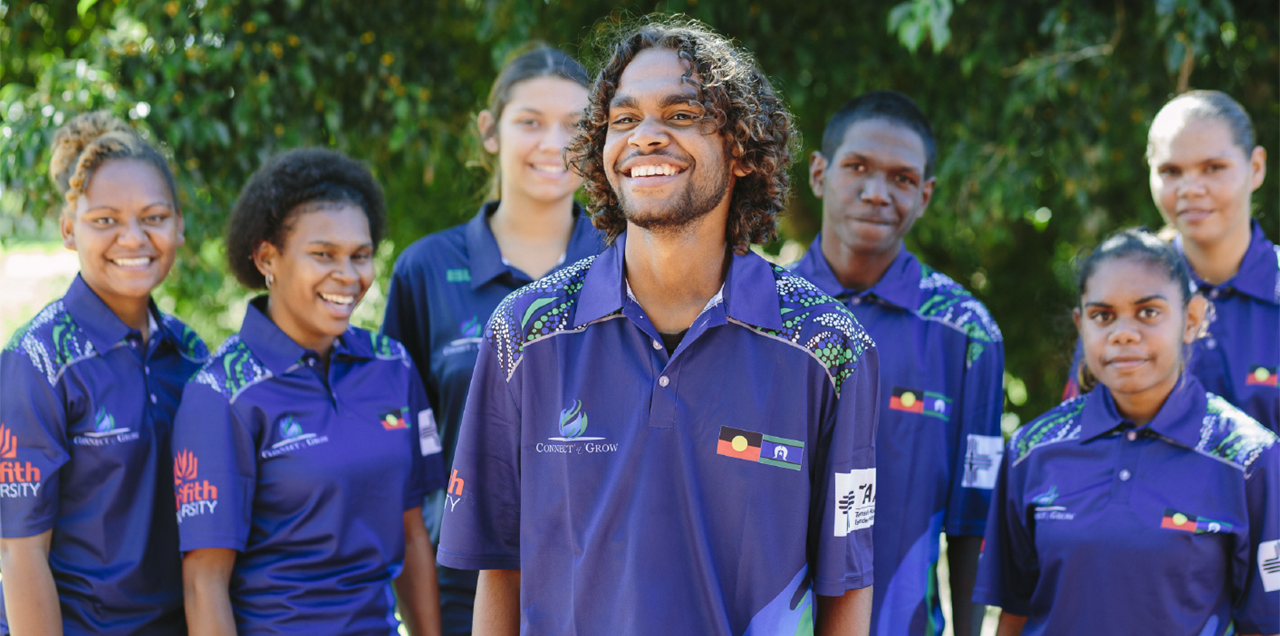
Connect 'n' Grow & Seed Foundation Australia
Aboriginal and Torres Strait Islander communities experience poorer health and subsequently have a shorter life expectancy than non-indigenous populations in Australia.
Inside-up
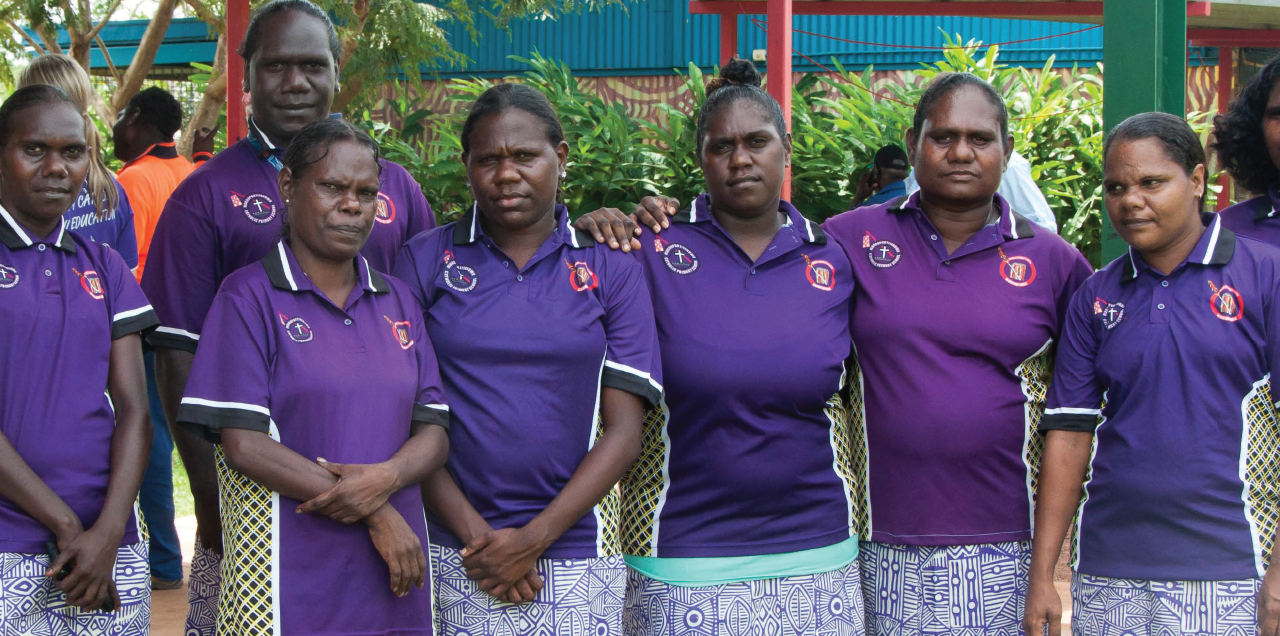
Catholic Education Northern Territory
High teacher turnover and a lack of continuity makes it difficult for Aboriginal and Torres Strait Islander students who often struggle to meet national education standards.
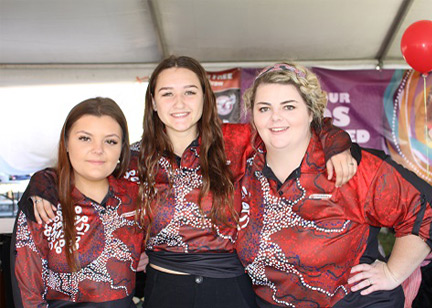
UnitingCare Queensland
UnitingCare Queensland is a health and community services provider, and one of the largest charities in Australia.
VET retention in remote Aboriginal and Torres Strait Islander communities
This report examines five unique vocational education and training (VET) programs in remote areas and identifies how retention and completion can be improved and what other indicators of success are important outcomes of training in remote communities.
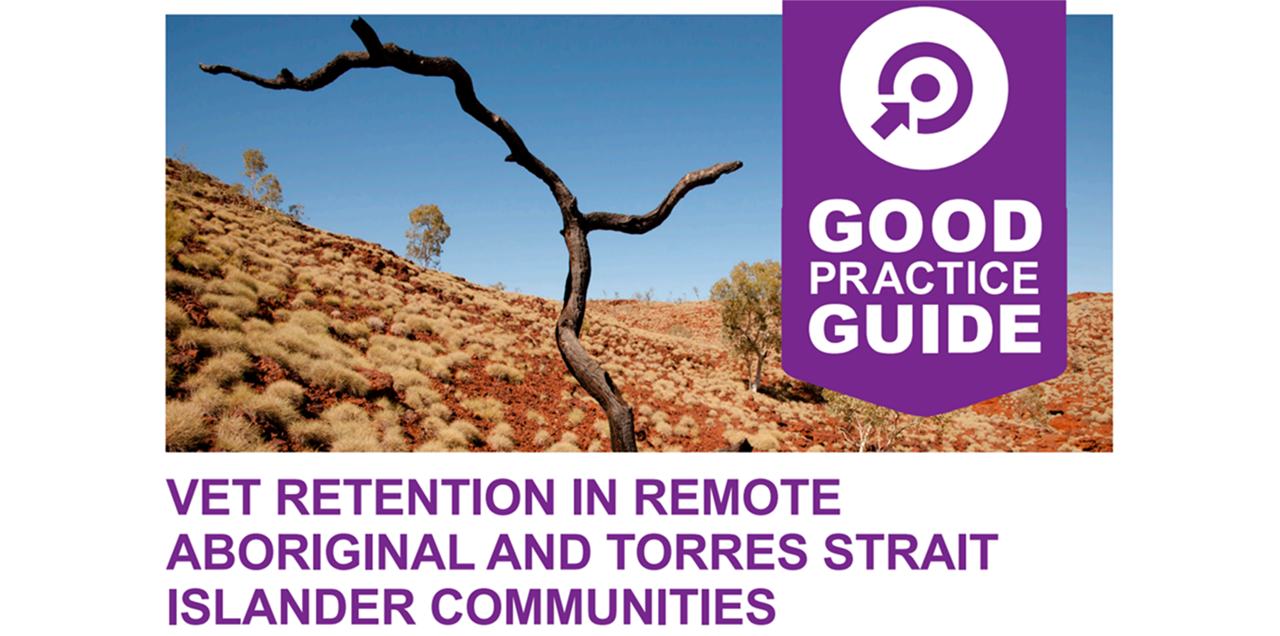

VET retention in remote Aboriginal and Torres Strait Islander communities
This report examines five unique vocational education and training (VET) programs in remote areas and identifies how retention and completion can be improved and what other indicators of success are important outcomes of training in remote communities.
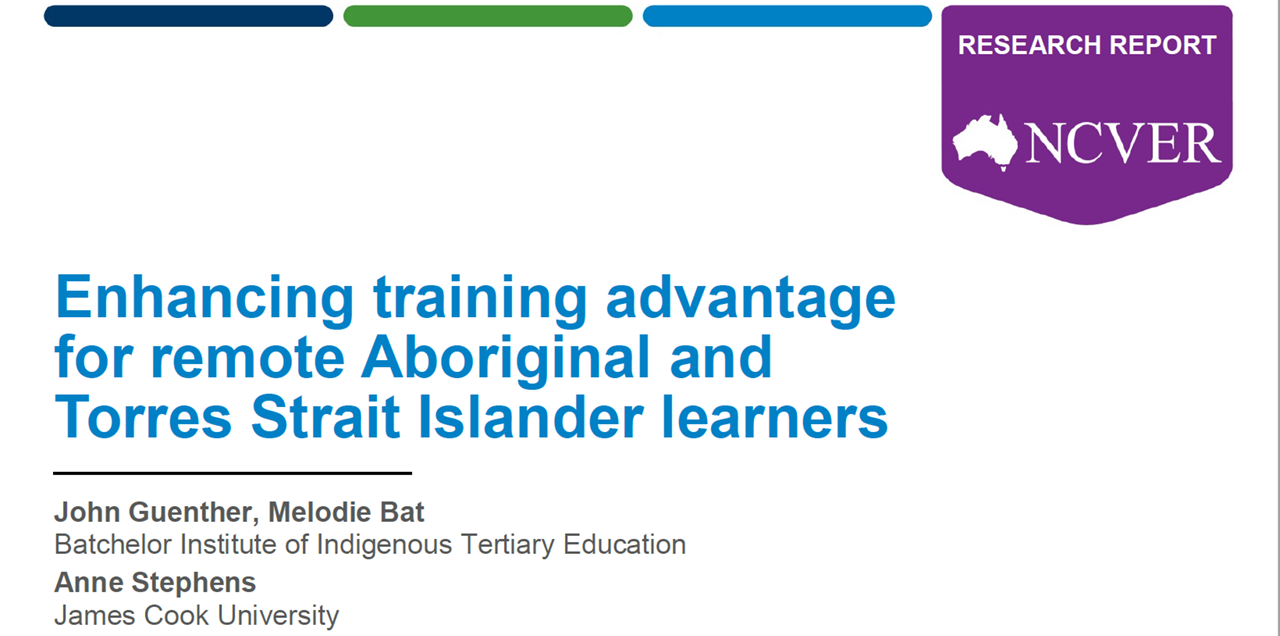
Enhancing training advantage for remote Aboriginal and Torres Strait Islander learners
Aboriginal and Torres Strait Islanders in very remote parts of Australia are increasingly participating in vocational education and training (VET); however, completion rates remain low and employment outcomes are not improving. This project identifies how retention and completion can be improved and what other indicators of success are important outcomes of training in remote communities.
National Aboriginal and Torres Strait Islander Health Workforce Strategic Framework 2016-2023
This framework provides a guide to assist the planning, prioritisation, target setting monitoring, and reporting of progress in increasing Aboriginal and Torres Strait Islander health workforce capacity and capability building.
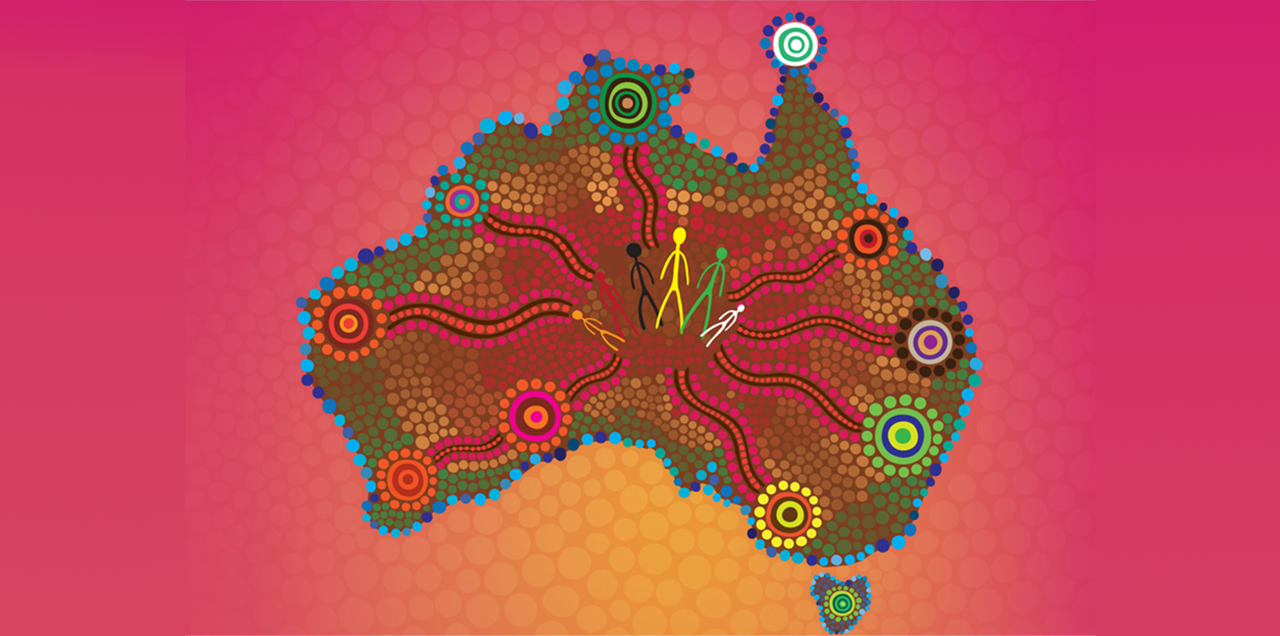

National Aboriginal and Torres Strait Islander Health Workforce Strategic Framework 2016-2023
This framework provides a guide to assist the planning, prioritisation, target setting monitoring, and reporting of progress in increasing Aboriginal and Torres Strait Islander health workforce capacity and capability building.
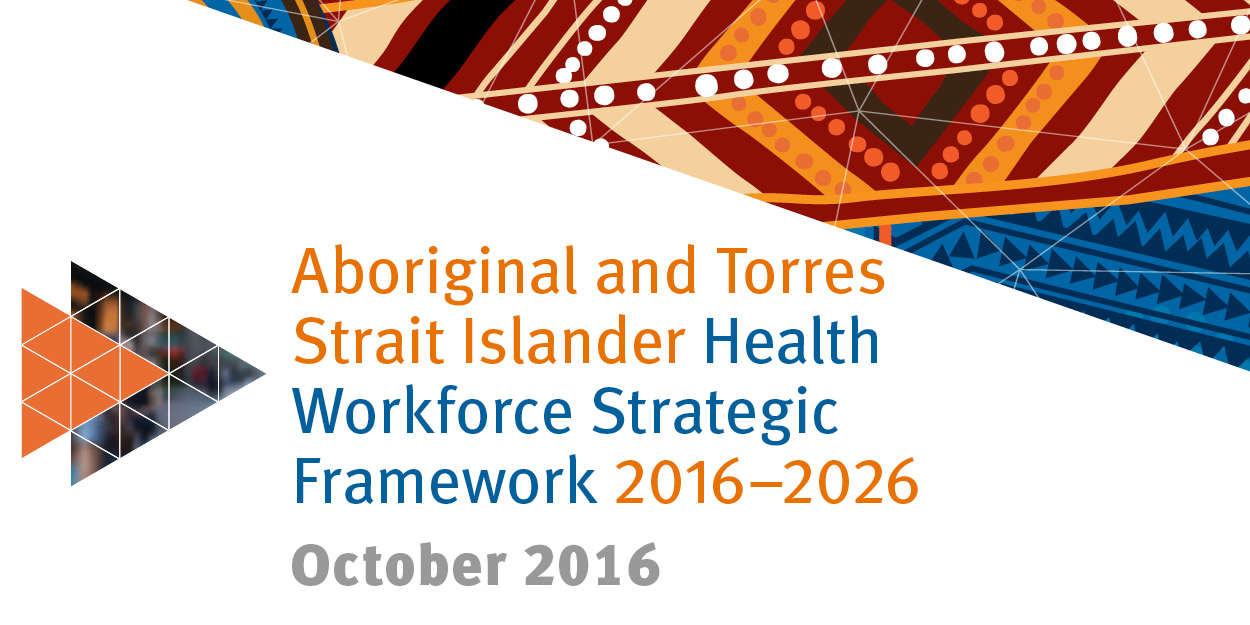
Aboriginal and Torres Strait Islander Health Workforce Strategic Framework 2016-2026
This framework is Queensland Health’s key response to the whole-of-Queensland government strategy, Moving Ahead – A strategic approach to increasing the participation of Aboriginal people and Torres Strait Islander people in Queensland’s economy 2016-2022. It aims to increase the Aboriginal and Torres Strait Islander workforce opportunity across the Queensland Government health sector in clinical, non-clinical and leadership roles.
